- Home
- Bianca Blythe
My Favorite Duke (The Duke Hunters Club Book 2) Page 2
My Favorite Duke (The Duke Hunters Club Book 2) Read online
Page 2
Excitement swept through Lucas’s veins. This was what they’d been waiting for.
“In that case, we must intercept it.”
Lucas rose, remembered to pick up his spectacles, placed them on his nose, then creased his clothes. He said a silent prayer his valet wouldn’t wander into the library. Now he resembled an academic, prone to absent-mindedness and sudden musings on cryptic subjects, rather than someone apt to chase criminals.
Academics, Lucas had discovered, were dismissed as harmless. They only caused schoolboys to quiver.
Lucas left the library, conscious of Sebastian on his side. They ducked under the centuries-old heavy wooden beams and strode toward the exit.
“Ah!” Stanley rose rapidly from his chair beside the main door, and for a moment, Lucas regretted not insisting on a smaller staff. “Leaving, Your Grace?”
“Yes. Just going to inspect some flowers.” Lucas adjusted his spectacles. “There’s a special rare one I want to see.”
“At night?”
“Oh, yes. It’s—er—important to see how flowers react at night.” Lucas strove to nod his head knowledgeably.
“Do the petals open? Do they close?” Sebastian added lightly.
Lucas flashed him a disgruntled look. This whole thing wouldn’t work if people didn’t take them seriously.
“Very well, Your Grace.” The butler’s gaze rolled over Lucas’s rumpled clothes, then he averted his eyes. “Shall I ask the groom to prepare the carriage?”
“That won’t be necessary, Stanley. We’ll be taking our horses. We merely require our frock coats.”
Once they were dressed appropriately to confront the customary nighttime fall in temperature, Lucas hastened from the cottage, lest Stanley gather his courage to ask why Lucas consistently dressed worse when he departed.
The ride to Ullswater was short, and Lucas and Sebastian tied their horses to a tree. During the day, the Lake District’s beauty was undeniable. Streams of people rambled over the mountains. Those not clutching guidebooks gazed at the lake in triumph, as if they’d personally discovered it, while the ones in possession of a map portrayed equal pride at following the map’s guidelines correctly.
A full moon shone in the heavens, but clouds happily darted over, masking what otherwise might have been an enjoyable view. Occasionally, glimpses of the inky silhouette of the mountains appeared. The floral scent wafting about him from the wildflowers seemed hardly fear-inducing.
Lucas scanned the surroundings and listened for a murmuring of voices, a snap of a twig, or any sign to indicate someone’s presence. Instead, silence pervaded.
“No one’s here,” Lucas said finally.
“Yet.”
Lucas’s legs sank into a muddy puddle. Indubitably, his valet would struggle tomorrow to retain his always neutral countenance.
“Let’s get off this road,” Lucas said.
The first step to ensuring the counterfeiters didn’t continue to get away was to make certain they were not observed. Lucas headed toward a hedge, then scrambled beneath it, ignoring the leaves and brambles that pierced his coat.
This was almost like being in the army.
But instead of sneaking about France, he was in England.
Perhaps he’d helped defeat the French, but his battling wouldn’t finish until he’d secured actual peace. He hadn’t fought in France for his countryside to be besieged by criminals, no matter if they spoke English rather than French and possessed an enthusiasm for cricket.
Lucas and Sebastian huddled beneath the hedge. A warm aroma wafted over them. Were Lucas an actual botanist, he might have desired to name the various plants of which the hedge was composed. Lucas preferred to focus his attention on the empty road instead. He reserved any knowledge about plants to dinner parties. Then the facts might cause his host’s eyes to glaze as his hostess frantically attempted to change the conversation to her daughter’s skills with the paintbrush.
Lying underneath a hedge was not Lucas’s ideal use of his time. Hedges had a habit of scratching one, even if their aroma was pleasant.
“I despise this,” Sebastian said.
These hedges might have thorns, but they did not compare to the unique horror found in having a French soldier wielding a bayonet charge at one. Thorn injuries had not yet had articles devoted to the best ways to heal them.
Still, Lucas was not increasingly happy when rain started to dribble over him. The fact was irritating. The first minute of rain might be refreshing, but rain had a tendency to fall for longer than a minute, and there was nothing about tonight’s drops for him to suspect the rain might proclaim a sudden preference to stay in the angry-looking clouds that sailed above as if a fleet of elephants were trampling the sky.
Finally, the unmistakable sound of wheels grinding and horse trotting filled the air.
Lucas glanced at Sebastian.
“There’s a coach,” Sebastian whispered. “It’s right on time.”
Lucas grinned. “Then it must be him. No one else is driving here at night.”
Most of the vehicles about here were rickety. People drove carts and caravans, transporting supplies from one region to another. Most transportation could be on foot, and not be dependent on housing and feeding four horses in case one occasionally desired to go on a jaunt.
Sebastian glanced at the horses. “Do you want to follow the coach?”
“He’ll notice. Besides, that coach moves quickly.” Lucas frowned. He’d half expected the criminals to be riding something less magnificent. But then, whoever was responsible for the crimes that had taken place here had certainly earned money. This counterfeit money business was dangerous.
“We can stop the coach,” Sebastian said confidently.
“And what if the people in the coach aren’t a band of criminals?”
“Then there’s less chance of getting harmed,” Sebastian said gaily. “Come on!”
“I can’t have people recognizing me,” Lucas said. “I’m a duke. And unlike you, this is my home.”
“Er—yes.” Sebastian scratched his head. “Unlucky that. Well, you’ll have to pull that scarf over your face. And perhaps lose that fancy accent.”
“But—”
Sebastian wound his cravat over his face, covering his mouth and nose. Lucas sighed and did the same.
“This is a terrible idea,” Lucas said.
“We could catch him.”
Lucas was silent. Sebastian had a point.
He refused to let the criminals flee. He needed at least to learn their identity.
The coach continued toward them, winding up the hill.
Sebastian strode into the middle of the lane.
Lucas sighed. Sebastian was overly brave. Lucas found a long tree branch that had fallen and dragged it into the road. Sebastian quickly grabbed the other end, and they barricaded the road.
“Halt! Halt!” Lucas’s voice boomed, and the driver slowed.
The man was younger than he expected, and Lucas furrowed his brow. Perhaps the criminal kept his more muscular hires inside.
The horses stopped before the tree, neighing irritatingly and pulling against their reins. The driver’s face whitened, the fact evident under the glow of the lamp that swung above him.
“What are you doing?” the driver’s voice trembled.
“I’m going to discover what you’re carrying in that carriage,” Sebastian shouted.
Lucas cringed.
What if they were wrong?
“Don’t try anything,” Lucas warned, closing the distance between them abruptly. His feet sank into muddy puddles, as if even the ground itself conspired to hinder him from this social impropriety.
The driver quivered, and Lucas jerked his head toward Sebastian.
“Watch him,” Lucas growled.
He headed for the coach himself, ignoring the mud that grasped hold of his boots with each step. No one should be on this road now. He checked to ascertain his scarf covered his face, then pounded on
the carriage door.
CHAPTER THREE
Commotion sounded outside the carriage, and it swerved inelegantly on the road before stopping entirely. A velvet pillow landed on Juliet’s knees. Though Juliet was not in the habit of frowning, she did so now.
The pomona bows on Genevieve’s dress flew up, in a manner never presented on the style sheets of Matchmaking for Wallflowers. Genevieve’s mouth dropped open uncharacteristically, then she hastily smoothed her dress.
Fiddlesticks.
Genevieve had been reluctant to come along on the trip and had only agreed to prevent Juliet from embarking by herself. This experience was unlikely to reassure her.
The carriage lamp, thankfully, still shone inside, and Juliet scrambled toward the door.
Had the driver spotted the duke? Perhaps her darling betrothed had waved down the carriage. Juliet’s heart filled until she remembered all the other things that might have happened. Perhaps the driver had seen a mangled carriage and was furiously contemplating how he might inform Juliet that her betrothed’s body lay in several pieces.
Brisk wind tapped against the carriage, as if to dissuade her from exiting. A cyclone wouldn’t be a match for Juliet, and she placed her hand on the handle.
“What are you doing?” Genevieve asked.
“Perhaps the driver has found the Duke of Sherwood,” Juliet said, offering the most optimistic possibility.
“Then he will tell us,” Genevieve said. “Most likely, he’ll continue his journey. That will be more difficult with the door open.”
Juliet hesitated, then settled back on her seat. Murmurings sounded outside. The seat felt suddenly more uncomfortable, despite the abundant assortment of pillows. The tassel edges were more conducive to aesthetic wonder than comfort, but Juliet doubted she could blame them for the odd quivering of her heart.
“Besides, the duke shouldn’t know you’re here,” Genevieve said. “He might think it improper.”
Juliet hesitated. “He’ll see it as a sign of our true love.”
“Perhaps,” Genevieve admitted. “But one can’t be certain. Besides, perhaps Timothy stopped for another reason.”
Juliet furrowed her brow. “Such as?”
Genevieve frowned, then beamed. “Perhaps he heard an interesting bird chirp and is ruminating on whether he recognizes it. Or perhaps one of the horses is doing its best to suggest a nap. He merely has to remind the horse that there will be far better resting spaces later, ones that contain hay, water, and involve not being tied to a carriage.”
Juliet considered this.
“Besides, he’s bound to continue driving soon,” Genevieve added.
Perhaps Genevieve was correct. She’d never viewed Genevieve as an expert in logic, perhaps because their friend Margaret was so gifted at science and mathematics.
“Does the driver normally stop here?” Juliet asked.
“It’s the middle of the road.” Genevieve frowned, even more than when Juliet had first suggested they take the carriage in pursuit of her charming, albeit missing, betrothed.
“Perhaps the driver is taking a break to—er—smoke.”
“One would wonder where he found the tobacco,” Genevieve mused. “I’ve never seen Timothy take an interest in pipes before. He’s not that type of person.”
No doubt, her cousin’s observances were correct.
Words sounded from outside.
Whatever Timothy was doing, it involved speaking, and it involved speaking a conversation not dotted in laughter and benign murmurs of agreeableness.
This conversation involved raised voices.
Though Juliet did not know much about Timothy, he seemed a straightforward youth, one unlikely to develop a mid-drive passion for theatrics and ventriloquism.
“Perhaps another carriage spotted him and is being helpful,” Juliet said, though her voice sounded less confident than previously.
Her heart seemed to do funny things in her chest.
“We shouldn’t have come here,” Genevieve said miserably.
Juliet was silent.
She’d come to the same conclusion, like a mathematics problem with only a single solution. There was no fault in her cousin’s logic. Usually the fact might have reassured her, but now Genevieve’s intellectual prowess churned uncomfortably in her stomach.
Juliet had been rash in leaving so late. She’d had the impression that were she to wait, she would decide the next morning not to leave, making excuses for him. Had her mother made excuses? When she’d first suspected everything was not as it should be?
Juliet shivered.
It’s the cold, she reminded herself. Juliet was prone to shiver in the cold. It was a habit she’d developed as a child, one all other people seemed to share.
Nothing was the odd or ominous about shivering on a cold Cumberlandian night.
And yet the conversation between the driver continued.
She strained to hear.
Something about getting out of the coach.
And something else about not pulling any funny tricks.
Juliet refused to ponder highwaymen. Just because highwaymen loitered around some roads, did not mean they would attack her coach. That would be unlikely. Percentage-wise it was improbable that highwaymen would be here.
Perhaps Timothy had a reputation as a jester in this village, and the person he was speaking to could not abide that another one of his handkerchiefs might be stolen in the name of magic.
The thought seemed weak, and Juliet’s mind returned to masked bandits, despite her best efforts, something that might have caused even her most accommodating governess or teacher to have rolled her eyes, unsettled by Juliet’s dramatic drop in intelligence.
Perhaps something else was happening.
Something dreadful.
The coach jerked to a start. It veered sharply to the right, and the door slammed. Then the carriage barreled in the same direction as it had come from, the opposite direction of which it should travel. Juliet hastily bolted the door, before the coach lurched forward, as if it had confused itself with a cannon propelled by gunpowder and decades of careful research funded by vast government coffers.
Genevieve screamed.
Juliet screamed.
The horses neighed outside, but had their vocal cords been arranged differently, Juliet was certain they would also be screaming.
“Does this normally happen?” Juliet asked as the coach continued to roll over the road turbulently, not seeming to care about possible pebbles and puddles and their potential precariousness.
“No!” Genevieve scrambled for her reticule, her ribbons and ruffles flying upward, as if her dress were also assessing the aerodynamic potential for flight.
Personally, Juliet had no need for her reticule, even if her hair probably looked appalling, her curled locks becoming uncurled with a haste that would have startled her lady’s maid and her years-long experience with hot tongs.
Her cousin, though, seemed determined to open her reticule, undoing the clasp, a feat doubtless complicated when the coach was busy swerving at an advanced speed.
Voices shouted around her. Galloping horses sounded. Why on earth were horses galloping about? On both sides of the carriage?
Juliet had never heard that people in Cumberland were prone to an utter disregard for safety. She’d always perceived people from Cumberland as emanating calm, in the habit of rambling in the cold over rigid terrain, exclaiming over the area’s beauty rather than the sharp inclines, bursts of rain, and slippery junctions.
“I’ve got it!” Genevieve shouted, waving her now open reticule in triumph.
Juliet blinked.
The coach continued to dash forward, the horses continued to gallop, joined by the odd horse riders.
The driver did not seem to mind that he was directing the carriage in the exact opposite direction of that which he’d seemed determined to drive in for the past hour.
At this rate, they would be back at Genevieve’s parents�
� in the next thirty minutes.
Then Genevieve removed a pistol.
“Genevieve?” Juliet’s breath came out in a gasp.
She’d never seen a pistol before, apart from in illustrated books and on the walls of creaky manor houses, coupled with collections of snort boxes and pipes.
But that was assuredly a pistol. Juliet did not have the slightest doubt, though the handle of the pistol seemed to be of pearl, and it gleamed in an attractive manner she associated more with her cousin’s exemplary taste in gowns and bonnets.
“What are you doing?” Juliet shrieked.
“I think it’s obvious,” Genevieve said gaily.
“Genevieve!” Juliet exclaimed. “You can’t have that!”
Genevieve pursed her lips, then fiddled more in her reticule, until she removed a small case triumphantly. “I’m being safe.”
“You’ll get someone hurt,” Juliet said.
“That’s rather the point.” Genevieve opened the small box. “I just need to load it.”
Heavens.
Juliet would not let Genevieve accidentally shoot the driver or some man asking for directions. She leaped toward Genevieve. Her cousin made a startled sound.
“Give me that,” Juliet shrieked.
“You don’t know how to use it,” Genevieve protested. “We need to defend ourselves!”
“Nonsense.” Juliet grabbed the glossy handle.
The carriage stopped. Footsteps crunched against twigs and leaves, then the door opened. Juliet jerked her head toward it.
A man stood before her.
A masked man.
Juliet doubted Timothy had adopted the habit of wearing a mask.
The man widened his eyes, as if he didn’t anticipate seeing passengers inside the carriage. Genevieve’s father might be wealthy, but he was hardly in the habit of sending a groom off in a carriage by himself.
“Greetings,” the masked man said in a velvety tenor tone.
Timothy, despite his merits in personality and knowledge of both horses and carriages, had never sounded warm and reassuring, like the brandy men sipped in sparkling crystal tumblers.
Genevieve shot her a frustrated look, and Juliet remembered she was holding a pistol.

 The Earl's Christmas Consultant
The Earl's Christmas Consultant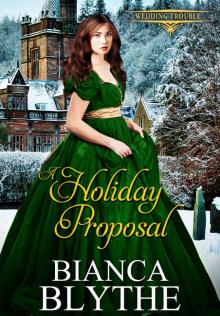 A Holiday Proposal (Wedding Trouble Book 6)
A Holiday Proposal (Wedding Trouble Book 6) The Earl's Christmas Consultant (Wedding Trouble Book 3)
The Earl's Christmas Consultant (Wedding Trouble Book 3) A Kiss for the Marquess (Wedding Trouble Book 5)
A Kiss for the Marquess (Wedding Trouble Book 5) My Favorite Duke (The Duke Hunters Club Book 2)
My Favorite Duke (The Duke Hunters Club Book 2) The Sleuthing Starlet Mysteries
The Sleuthing Starlet Mysteries Lords, Snow and Mistletoe
Lords, Snow and Mistletoe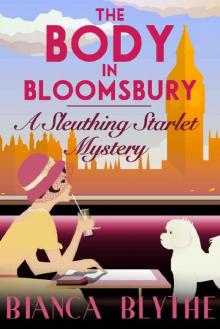 The Body in Bloomsbury
The Body in Bloomsbury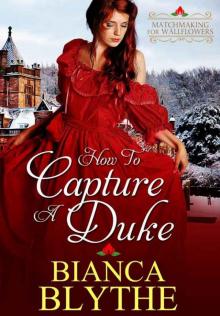 How to Capture a Duke (Matchmaking for Wallflowers Book 1)
How to Capture a Duke (Matchmaking for Wallflowers Book 1)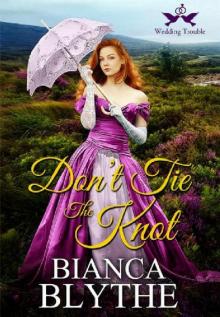 Don't Tie the Knot
Don't Tie the Knot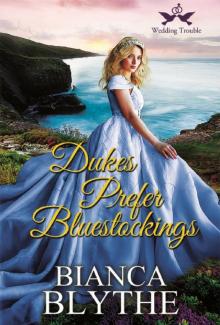 Dukes Prefer Bluestockings
Dukes Prefer Bluestockings A Marquess for Convenience (Matchmaking for Wallflowers Book 5)
A Marquess for Convenience (Matchmaking for Wallflowers Book 5) Lords, Snow and Mistletoe: A Regency Christmas Collection
Lords, Snow and Mistletoe: A Regency Christmas Collection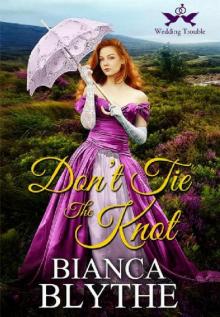 Don't Tie the Knot (Wedding Trouble Book 1)
Don't Tie the Knot (Wedding Trouble Book 1) The Perfect Fiancé (Matchmaking for Wallflowers Book 0)
The Perfect Fiancé (Matchmaking for Wallflowers Book 0)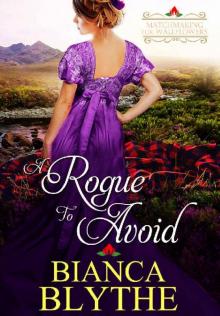 A Rogue to Avoid (Matchmaking for Wallflowers Book 2)
A Rogue to Avoid (Matchmaking for Wallflowers Book 2)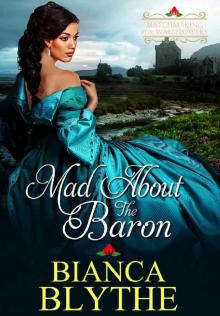 Mad About The Baron (Matchmaking for Wallflowers Book 4)
Mad About The Baron (Matchmaking for Wallflowers Book 4)